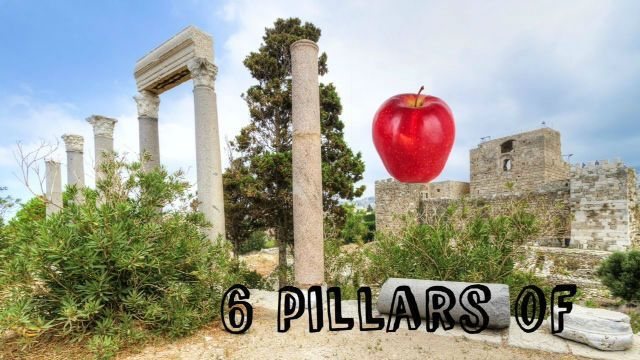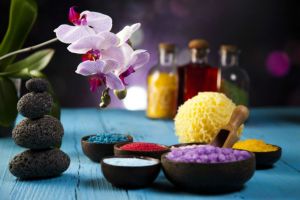
To build a strong and sturdy home, you must consider your foundation. Obviously the strength and durability of a home is directly related to the strength and durability of its foundation. Human health is not much different.
The pillars that build and maintain health are an integral part of our overall physical and mental wellbeing, not to mention our longevity. Building strong pillars of health does not happen overnight. It is a process that takes time, commitment and patience. However, it is one that will reward you in many ways.
Here are 6 pillars of great health that anyone seeking to live their life to its fullest should consider:
Pillar # 1: Real Food
Your body does not know what to do with fast and highly processed foods any more than a car knows what to do with Kool Aid in the gas tank. Proper nutrition is essential for human health. In fact, it is so essential that without it the body is always in a state of “robbing Peter to pay Paul” – trying to remain in a constant state of balance without proper nutrients for fuel puts a tremendous strain on internal organs and cells are unable to function as they should.
Eventually, the body becomes malnourished and turns into the perfect environment for disease, resulting in conditions such as diabetes, heart disease and cancer. Unfortunately, we are a nation with an obesity epidemic stemming from malnutrition.
So, the first pillar of good health is to eat real food and plenty of it. Let’s not starve ourselves on some get-thin, quick diet or by skipping meals. The body requires food for fuel and without a variety of real and wholesome food – minimally processed and  preferably organic – it will not get far.
preferably organic – it will not get far.
Real food is farmed, processed and prepared in ways that have been around for thousands of years. Real milk and real beef come from grass-fed cows that range free on pasture that is not tainted with pesticides or chemical fertilizers, real eggs come for hens that eat grubs, not grain, real lard is not processed, olive oil is cold pressed and tofu comes from fermented non-gmo soybeans.
Everyone has to eat – why not make your food choices wisely as you build your pillars of great health?
Pillar #2: Movement
Do you find yourself looking for the closest parking spot at the mall? Perhaps this is a time issue, a habit or a conscious decision because you don’t feel like walking. Our culture prides itself on convenience and we pay the price for this in poor health. Movement is critical to a healthy, long and enjoyable life. The old saying, “use it or lose it,” is very true. When a body is set in motion, it stays vibrant and strong. When we are sedentary for long periods of time, every part of our body becomes weak and unhealthy.
According to a well known author and clinician, if you don’t use it you will never find it. Locked in our genes is healthy physiology and biochemistry, without proper movement, these genes are never expressed. In his book, The 14 Foundational Premises for the Scientific Validation of the Chiropractic Wellness Paradigm, Dr. James Chestnut states that daily physical exertion is an essential nutrient.
According to Chestnut, a deficiency in exercise and lack of proper posture leads to imbalances that create the perfect environment for illness to thrive. It is impossible to be completely healthy without allowing for gene expression, which is dependent on  homeostatic exercise and good posture.
homeostatic exercise and good posture.
In addition to unlocking favorable genes, movement stimulates the spinal cord and sends messages to the cerebellum which are necessary for balance and location, as well as coordination of moods, emotions, learning and organ function. Movement also decreases the stress response. This is highly valuable because we live in a day and age when most people tend to be stressed about something.
While we may not have to hunt for or gather our food, we certainly can make more of an effort to be physically engaged each day. Even doing things such as parking further away from the store, taking the stairs instead of the escalator or elevator and getting up often from your desk to walk around or stretch can help.
Pass on television for a bike ride or a walk and plan your weekend activities around things you can do outside. Clip on a pedometer and work it. Aim for around 10,000 steps daily to express your full genetic potential.
Pillar # 3: Stress Management
Stress is a part of life, and some amount of stress is healthy, and essential. However, when we let stress overtake us, our health can begin to deteriorate.
According to Janice Kiecolt-Glaser of Ohio State University, stress can wear on our immune systems, because it inherently creates its own immune response. She explains that stress causes the body to release pro-inflammatory cytokines, which are immune factors that trigger the body’s response against an infection.
In the case of chronic stress, cytokines are continuously produced for extended periods of time, which can lead to a diminished ability to fight infection and heal wounds by the immune system, as well as chronic inflammation. Chronic inflammation has been linked to an increased risk of osteoporosis, type 2 diabetes, heart disease and any of the many autoimmune diseases.
 One natural and soothing way to alleviate stress is to harness the power of essential oils. Essential oils provide the healing properties of the plants they are extracted from, in a highly concentrated form. They can be applied to pressure points, used in therapeutic massage, and for aromatherapy.
One natural and soothing way to alleviate stress is to harness the power of essential oils. Essential oils provide the healing properties of the plants they are extracted from, in a highly concentrated form. They can be applied to pressure points, used in therapeutic massage, and for aromatherapy.
The essential oil of lavender (Lavandula angustifolia) has been cherished for centuries for a wide variety of uses. These include relief of anxiety, depression, fatigue and insomnia. Lavender used in aromatherapy has been associated with deeply soothing, sedative effects.
Lavender essential oil can also be used for massage, and applied to pressure points, including the temples, to help relieve anxiety. This oil is gentle enough to apply directly to the skin (in adults), although for massaging large areas of the body, you can dilute it in organic, cold-pressed coconut oil – three parts coconut oil to one part lavender.
Another stress reducing tool is exercise; there is something about breaking a sweat, especially in the fresh air, that relaxes the mind. While exercise has been shown to produce new, excitable brain cells, it also calms certain areas of the brain. Even something as simple as a daily walk can do wonders to relieve stress.
Meditation is a method that has been used since ancient times to center the mind and let go of racing, worried thoughts. It allows one to fully ease into the present moment, and when practiced regularly, it can be a powerful tool to help both prevent anxiety, and extinguish anxious thought patterns once they begin.
Pillar # 4: Sleep
New York may be known as a city that never sleeps but it may be more appropriate to say that America is a country that never sleeps. The majority of Americans get far too little sleep. In fact, sleep deprivation is reaching epidemic proportions in our country. The Center for Disease Control and Prevention reports that one in five Americans is getting less than six hours of sleep per night. This is significantly shy of the seven to eight hours that is recommended.
Sleep deprivation may lead to such things as increased risk for depression and substance  abuse, decreased motor skills and an increased risk of automobile accidents.
abuse, decreased motor skills and an increased risk of automobile accidents.
In addition, people who are short on rest often struggle with memory impairment and are more likely to develop diabetes, stroke and heart disease than people who sleep regularly. Basically, not getting enough Z’s can be incredibly unhealthy.
Research indicates that a lack of sleep also impacts our fat cells and their ability to respond appropriately to insulin. Researchers at the Center for Sleep and Wake Disorders note that there is an “intimate” relationship between sleep and maintaining a healthy body weight.
A recent study funded by the National Institute of Neurological Disorders and Stroke (NINDS) documents the process by which sleep quite literally flushes the brain of toxins that are accumulated throughout the day.
During the course of the study, researchers injected dye into the cerebrospinal fluid (CSF) of mice, and observed the way it flowed through their brains, while also keeping track of their electrical brain activity. The research team found that the fluid flowed quickly through the brains of the mice when they were asleep or under anesthesia, but very slowly when the mice were awake.
One of the study’s leaders, Dr. Maiken Nedergaard of the University of Rochester Medical Center, said, “we were surprised by how little flow there was into the brain when the mice were awake. It suggested that the space between brain cells changed greatly between conscious and unconscious states.”
Indeed, when the researchers measured the space between the brain cells of the mice using electrodes, they found that the space increased by 60 percent when the mice were asleep or under anaesthesia. This is attributed to the glymphatic system, a sort of plumbing mechanism which helps regulate the flow of CSF in the brain, opening up during the sleep cycle.
When the researchers injected beta-amyloid, a protein linked to Alzheimer’s disease, into the brains of the mice, they observed that it disappeared faster when the mice were asleep than when they were awake. As Dr. Jim Koenig, a program director at NINDS summarizes, “these results may have broad implications for multiple neurological disorders.”
Aside from this study, a large body of research has found that sleep is absolutely essential to a healthy life, from improved mental health to lowered risk of a host of chronic diseases. A study performed at the University of California, Berkeley found that sleep deprivation can lead to increased cravings for junk food.
If you have a hard time getting at least 7 hours of sleep per night, try changing around your schedule, if possible, to make sure you succeed. If you have a hard time falling asleep, try meditating before you go to bed, even for a few moments, and keep electronics away from your bed.
A cup of chamomile tea or a glass of tart cherry juice before bed may also help you coast along to dreamland, which, according to a study reported in the European Journal of Nutrition can boost melatonin, the hormone which signals your body that it is time to sleep.
Social Connection
Even if you just share some time with one other person, it is important to your overall health and wellbeing to be social. You don’t have to be involved in everything but just something that allows for some human interaction from time to time.
Research shows that people who spend a great deal of time alone, isolated from others, are not as healthy as those who have more social engagement. In contrast, studies also show that “social capital” is one of the biggest predictors of health, happiness and longevity. Sadly, many miss the real importance of social connection and become quickly isolated.
According to Environmentalist and author Bill McKibben, staying connected is important not only for our physical and mental health but also for the health of the planet. He says that until we see other people as our main source of security, we will continue to destroy our earth and use its resources unwisely.
 He advocates for closer community ties in neighborhoods and reconnecting with friends instead of running to the mall. We need to be engaged and invested in people for the sake of both the planet, ourselves and our family.
He advocates for closer community ties in neighborhoods and reconnecting with friends instead of running to the mall. We need to be engaged and invested in people for the sake of both the planet, ourselves and our family.
Having a group of friends that enjoy getting out and being active is great for your health as well. If you are looking to meet some new friends, consider joining a local civic group or a class at the nearby gym. No matter what your interest there are lots of different groups that are available from reading, sports and even music.
One caveat that professionals give is to try to find a “real” person-to-person group as opposed to an online group. While online groups can be great – they don’t get you out of the house and in the physical presence of others.
In addition, giving back to your community is important. We all need a sense of belonging and a sense of purpose which comes from helping others. Volunteering is a great way to share your time and talents with others.
If you have a lot of stress in your life, suffer from anxiety or just cannot seem to resolve a problem no matter how much you try, volunteering can give you the distance you need from your own mind and your own problems to see them from another angle. Even the act of doing something active, especially for someone else, can give you a much-needed break from worrying.
Additionally, when you volunteer with people who are in need, such as homeless, disabled or disadvantaged families and individuals, you may find that your own problems do not seem so bad. You may even discover an inner sense of gratitude that resolves a lot of your stress and anxiety.
Spirituality
Spirituality helps people handle questions like, “Why am I here?” It is about having faith and finding your higher purpose, something many people struggle with. There is an expanding collection of research that is showing how important spiritual practices are for health and wellbeing. Spiritual practices may include such things as meditation, prayer, yoga and journalling.
Meditation helps to induce feelings of calm and improves concentration and attention. Richard Davidson is a brain researcher who has demonstrated that mediation can increase the brain’s gray matter and density which in turn enhances the immune system and helps regulate difficult emotions while relieving stress. Mindfulness helps to relieve depression, anxiety and has even been found to reduce symptoms of fibromyalgia, chronic pain, type 2 diabetes, cardiovascular disease and chronic fatigue.
Prayer helps to elicit feelings of hope, gratitude, compassion and an overall sense of wellbeing. Believing in a higher power brings a sense of comfort in difficult times. Recent studies indicate that adults suffering from depression, who believe their prayers were being answered, responded better to treatment than those who did not believe.
The ancient practice of yoga has been linked to numerous health benefits. Just a few include lowered stress levels, better flexibility and balance, improved focus and memory, stronger bones, greater lung capacity, relief from chronic pain and lowered blood pressure.
 Journaling is a wonderfully therapeutic contemplative practice that is often overlooked. Studies indicate that journaling allows you to express how you feel and work through difficult obstacles in your life. It is a place where you can safely vent and express things that may be difficult for you to talk to others about. It is important to start each journaling session with a list of things that you are grateful for. Being in the mindset of gratitude, no matter what your circumstance, helps you to put everything in perspective and is a stress reliever in itself.
Journaling is a wonderfully therapeutic contemplative practice that is often overlooked. Studies indicate that journaling allows you to express how you feel and work through difficult obstacles in your life. It is a place where you can safely vent and express things that may be difficult for you to talk to others about. It is important to start each journaling session with a list of things that you are grateful for. Being in the mindset of gratitude, no matter what your circumstance, helps you to put everything in perspective and is a stress reliever in itself.
Call to action: Don’t let this list overwhelm you. If you are not doing any of these things presently – get started today and make at least one change. Try to add a new pillar each month until you have created a solid foundation.
-The Alternative Daily
Sources:
http://bewell.stanford.edu/features/social-ties-good-health

